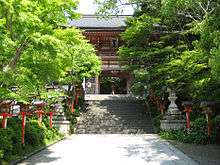Mount Kurama
| Mount Kurama | |
|---|---|
| 鞍馬山 | |
| Highest point | |
| Elevation | 584 m (1,916 ft) |
| Prominence | 44 m (144 ft) |
| Listing | List of mountains and hills of Japan by height |
| Coordinates | 35°7′26″N 135°46′17″E / 35.12389°N 135.77139°ECoordinates: 35°7′26″N 135°46′17″E / 35.12389°N 135.77139°E |
| Geography | |
| Location | Kyoto, Japan |
| Topo map | Geographical Survey Institute 25000:1 大原, 50000:1 京都及大阪 |



Mount Kurama (鞍馬山 Kurama-yama) is a mountain to the north-west of the city of Kyoto. It is the birthplace of the Reiki practice, and is said to be the home of Sōjōbō, King of the Tengu.
It was the Tengu who taught swordsmanship to Minamoto no Yoshitsune.[1]
Kurama is also the location of the annual Kurama Fire Festival (鞍馬の火祭り Kurama no Hi-matsuri), which takes place every October. Kurama-dera (鞍馬寺) is now designated as a national treasure of Japan.
The philosopher Hayashi Razan lists one of the three greatest of the daitengu as Sōjōbō of Mount Kurama.[2] The demons of Kurama and Atago are among the most famous tengu.[3]
Notes
The mountain is also known as the birthplace of the holistic healing art called Reiki. In the early 1900s (some say 1914, others say 1922), the founder of Reiki, Mikao Usui, meditated for 21 days on this mountain and received the Reiki healing energy. Mikao Usui meditated near the top of the mountain at a site called Osugi Gongen, at the site of a great sacred tree (kami) said to be an incarnation of the god Maoson.[4]
Further reading
- Mount Kurama & the Sonten Trinity, The myth and history of Mao's temple on Mt Kurama, which is the backbone of a Shingon Buddhist splinter group.
References
- ↑ Turnbull, Stephen (1977). The Samurai, A Military History. MacMillan Publishing Co., Inc. p. 61. ISBN 0026205408.
- ↑ de Visser, M. W. (1908). "The Tengu". Transactions of the Asiatic Society of Japan (ZP Maruya & Co.) 34 (2): 71.
- ↑ Mizuki, Shigeru (2001). Mizuki Shigeru No Nihon Yōkai Meguri. Japan: JTB. pp. 122–123. ISBN 4-533-03956-1.
- ↑ Reiki's Birthplace: A Guide to Kurama Mountain by Jessica Miller
| Wikimedia Commons has media related to Kurama-dera. |